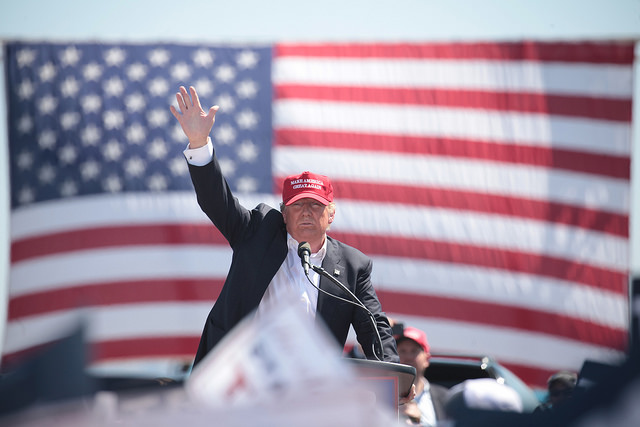The Trumping of US foreign policy
Posted By Christopher R. Hill on August 3, 2016 @ 11:00

The United States’ presidential campaign, already long and tumultuous, will no doubt become even more so in the coming months, as the two parties’ nominees, now officially selected, face off ahead of November’s election. But voters will have a clear choice before them, especially with regard to foreign policy.
The Democratic Party’s nominee, Hillary Clinton, promises continuity. A Clinton administration would remain a willing partner to America’s friends and allies, and it would make clear to America’s adversaries that the broad tenets of US foreign policy will not change. Current US policy, rooted in strength and guided by pragmatism, has been generally successful in ensuring peace and stability for decades.
Quite a different vision has emerged on the Republican side, with the nomination of Donald Trump. And yet the candidate is a secondary issue—a symptom of the rapid transformation of the Grand Old Party itself, which has been a bewildering spectacle for American and foreign audiences alike.
The GOP establishment spent the primary season wringing its hands, asking how something like the Trump candidacy [1] could happen. For example, in March 2016, hundreds of Republican advisers, representing a broad spectrum of foreign-policy views, signed an open letter [2] expressing their opposition to Trump. While some of these advisers may come to support him this fall, having been ‘reassured’ of his commitment to their views, most will not.
The GOP has produced a presidential candidate with such a dim view of America’s prospects that he thinks the country has entered an abyss from which it may never emerge. While much of the world still looks to the US for wise international leadership, the Republican National Convention in Cleveland, where Trump was formally nominated, projected nothing but fear and loathing.
One of the more striking elements of Trump’s speech at the convention [3] was his attack on the last Republican administration. He characterized George W. Bush as a co-conspirator with Hillary Clinton in various foreign entanglements, such as wars and, worse, trade deals.
Throughout his entire address, however, Trump made no reference to the rest of the GOP’s 162-year legacy. Abraham Lincoln? Forget him. General Dwight D. Eisenhower, a war hero and president who built the interstate highway system that Trump tells us is dangerously dilapidated? Never heard of him. And the delegates seemed to have no problem with these omissions, roaring in approval at every aggressive jab and apocalyptic warning.
Few took Trump, a reality-television star who has never held public office, seriously until he started winning primaries. Now he is the Republican Party’s nominal head and presidential standard-bearer. How did this happen?
Ronald Reagan, the modern-day GOP’s patron saint, once said that government is the problem, not the solution, a dictum that embodied the anti-government animus that has defined the party ever since. It is now a baked-in irony that any Republican running for office would just as soon do away with the government than actually serve in it. Small wonder, then, that Republican voters would nominate someone who had never served in government.
National defense has always been the sole exception to this anti-government view. But even on that issue, the GOP has changed. Trump has indicated that he would flout America’s NATO obligations [4], disregard institutions of global governance, and treat negotiations with other countries as ceremonies of surrender to US positions, rather than two-way deliberations.
And yet, if the GOP foreign-policy establishment wants to understand where a candidate like Trump came from, its members would do well to look at the behavior of some within their own ranks. Those, like Max Boot, who have often called for the unilateral use of force in global trouble spots, paved the way for him, even if they do not today support him. And others have helped him during his barroom-brawl campaign, as he turns civil policy disagreements into ad hominem attacks.
According to pollsters and pundits, Trump will most likely lose in November. If the last eight years wasn’t enough for Republicans to fix their party, perhaps another four or eight will suffice. One hopes they succeed. American democracy—and US foreign policy—needs at least two major parties, not one in the mainstream and the other on the extreme fringe.
Article printed from The Strategist: https://www.aspistrategist.org.au
URL to article: https://www.aspistrategist.org.au/trumping-us-foreign-policy/
URLs in this post:
[1] Trump candidacy: https://www.project-syndicate.org/onpoint/lies-liars-and-lawlessness-2016-07
[2] open letter: http://warontherocks.com/2016/03/open-letter-on-donald-trump-from-gop-national-security-leaders/
[3] speech at the convention: https://www.youtube.com/watch?v=4CVTuOyZDI0
[4] flout America’s NATO obligations: https://www.project-syndicate.org/commentary/trump-national-security-threat-by-bernard-henri-levy-2016-07
Click here to print.